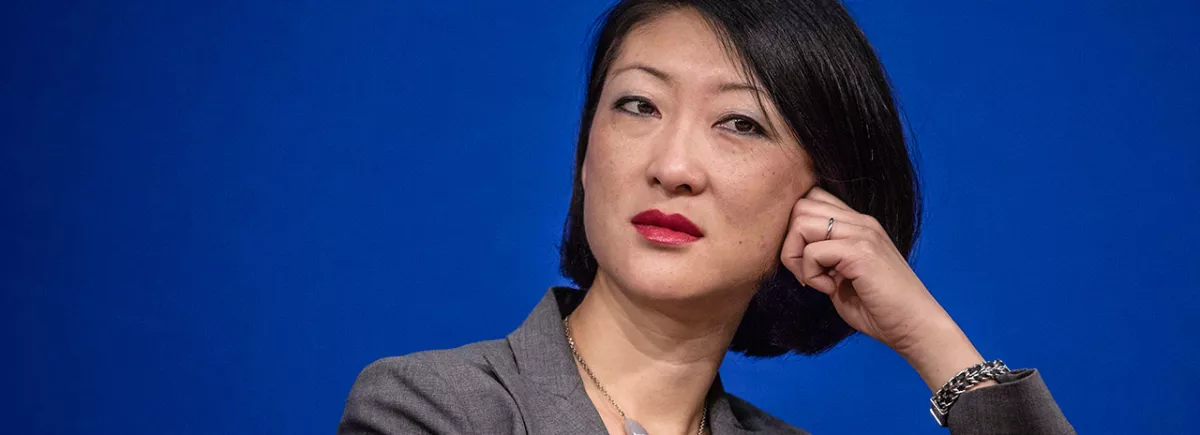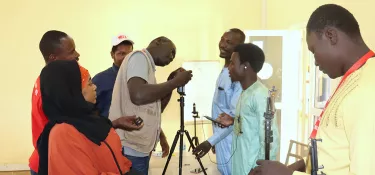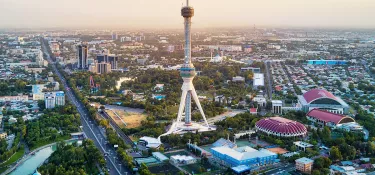
DTT: an opportunity for Africa and France
Related project
Modernisation of ORTM in preparation for the switch to DTTReducing the digital divide, utilising the digital dividend, increasing the number of channels.
These are among the opportunities which will be explored at the international ministerial conference spearheaded by Fleur Pellerin, Minister for Small and Medium-Sized Businesses, Innovation and the Digital Economy at the Ministry of Industrial Recovery.
On 7-8 November 2013 in Paris, Pellerin will host a gathering of ministers from sub-Saharan Africa in charge of digitalisation, under the heading:
The DTT switchover – a chance to develop Africa's digital economy.
On this occasion, Etienne Fiatte, CFI Managing Director, led a workshop on the digital content of future multiplex services
CFI, a development agency, has for 25 years been involved in helping African TV channels and, most particularly, the content they broadcast achieve modern professional performance levels.
It is today, not tomorrow – when DTT systems will already be in place – that attention should turn to content, because what TV viewers in Africa want, first and foremost, are images – better images and more of them.
Television is not the most urgent problem Africa is facing, but I firmly believe that it is one of the most powerful symbols of the current state of society in Africa.
It cannot be denied, unfortunately, given the weakness of home-grown production, that the strong images of Africa, by which I mean those images of your continent that populate our screens worldwide – and which predominant on screens in Africa – are too often produced elsewhere: the programmes viewed by Africans are not a true enough reflection of African society, as viewers are turning away from local programming.
Ladies and gentlemen, as your countries' Ministers responsible for the digital switchover, I would this morning like to try and persuade you, if you are not already convinced, that providing broader access to digital TV, via Télévision Numérique pour Tous , which is what we call DTT in France, is a historic opportunity for you to change this situation, to reverse this unequal exchange, and to regain control of your images, the images viewed by African citizens every day and which fuel their imagination and the way in which they see the world.
That is the state of play in terms of content – in my view it's much more important for your companies than systems – and it will affect you on two different levels:
- you will be able to build and to better regulate an offering of more, and more diverse, channels;
- you will be required, also, to produce more locally relevant programmes of better quality to ensure that not only your public but also your private operators are not swept aside by the strength of outside competition.
The channels challenge
Even before DTT arrived on the scene, a proportion of African TV viewers already had access to varied, often overseas, content via satellite and MMDS networks, and DTT multiplexes were also already available in certain big cities. Hence there was competition, at least in larger population centres. However, DTT will bring about a complete reshuffling of the deck for everyone.
In the past, in Europe, the deployment of cable and satellite systems generated a much higher number of channels than DTT multiplexes could absorb. The regulator was thus obliged to choose between all pre-existing offers and new projects.
In Africa, however, the situation is completely the opposite. There is little quality home-grown programming on offer at the moment and, potentially, there is a high number of frequencies available. This is therefore your opportunity to dramatically enhance the channel offering and to make it available to the population as a whole. You will be able to bridge the gap between those in urban areas – who enjoy most of the advantages – and the rest of the population.
There is, however, a risk involved: relying on programme offerings from outside owing to a lack of attractive local programming.
Looking on the bright side, there is also an advantage: by bringing network heads and multiplex operators together onto national territory, DTT will enable you to better monitor the consistency of this channel offering. This all comes under the legal and regulatory aspects that Laurence Franceschini will talk about in a few moments, using the French example.
In setting up a harmonious and sustainable televisual landscape, the public authorities need to bear three aspects in mind:
They have to respond, first, to public expectations, that is to say they have to increase the diversity of the televisual offering by meeting the very great need for proximity and identity that is prevalent in Africa and elsewhere.
They then have to respond to the expectations of socio-political operators, by which I mean they have to make a strong contribution to public debate by creating new "citizenship areas".
Lastly, they have to respond to the expectations of economic operators, by creating suitable conditions for the development of a programming industry and a qualified job market.
In terms of the composition of future multiplexes, it is to these three objectives that your thoughts should turn
The DTT offering will first focus on continuity, not only for TV viewers but also for economic operators. Existing public and private channels will therefore have to be taken in hand and this will be your opportunity to, as it were, reconcile serious operators and the all-too-many micro-channels that are currently broadcasting illegally.
If the African general public is to embrace DTT, there will have to be two revolutions: a degree of technical quality in terms of reception, which has hitherto been unknown, and the creation of new local TV channels. The process of selecting these new public and private channels, which will have to be viable and capable of investing in innovative, unifying programmes, must obviously be at the very heart of a national strategy on new content.
If they are genuinely to make a difference and to be the "go-to" channels, they must not be too numerous. In this connection, the idea of requiring new operators to pay a "joining fee" is a very interesting one (the HACA in Côte d'Ivoire has proposed the logging of CFA 1 billion). Where public channels are concerned, care must be taken for resources not to be spread too widely, since your governments are already finding it difficult to finance the operation of one channel, sometimes two channels. You should therefore guard against being overambitious…
This necessary caution and a realistic financial approach mean that, unlike most European countries and, in particular, France, you will have to open up your multiplexes to foreign channels, be these within Africa or outside of Africa. Incidentally, that is what is already happening in the case of the first multiplexes set up in Africa, where the fear was that there would be a void. Nevertheless, this opening up to the outside will from now on be controlled, since unlike the case of the satellite-derived "image deluge", which is difficult to control, DTT will involve an approval procedure as the essential component of each country's refound national sovereignty.
Turn your thoughts firstly to proximity, by negotiating reciprocal arrangements with channels in neighbouring countries – channels that your TV viewers are already accustomed to watching. But don't see this as competition or an undesirable influence; rather, see it as the opportunity for neighbours to get to know one another better, as a valuable way in which to experience another culture.
The way in which the market is structured could also be of advantage to pan-African or sub-regional channels that are currently struggling to attract viewers owing to their low profile. Their greater presence on Africa's multiplexes should boost their economic model.
In my view, however, the pan-African channel par excellence for the continent's French-speaking peoples should be TV5 Monde Afrique. For that to be so, you, the French-speakers of Africa, will have to take up your true position in the governance, management and programming of TV5 Afrique, because, at the moment, it has to be said, it is primarily a channel from the northern hemisphere speaking to the southern hemisphere. However, with DTT, you will be in a strong bargaining position and can offer TV5 Monde maximum exposure in Africa – that is undoubtedly what that French-language channel needs.
That is only my personal opinon, but I am aware that the Chairman of TV5 Monde, Yves Bigot, thinks along the same lines and has already had positive discussions with the political authorities in certain African countries.
Lastly, provided they make an effort to give the public what it wants, by devoting at least part of their programming to locally relevant broadcasting, the presence of channels from other continents will give your TV viewers the opening onto the world that they need in this globalised world.
To complete this review, it is worth remembering the other types of content that DTT multiplexes would be in a position to offer in the future and that analogue could not: interactive services in the areas of health, education, administrative information, or radio services in order that some of the excellent radio stations that currently have a limited listenership restricted to major towns and cities can become accessible everywhere.
Everywhere, and at least, in part, accessible free of charge to the entire population. I would stress this latter point, because during a recent trip to Nairobi I learned that one and perhaps two countries in East Africa had agreed to assign the entire DTT system to a foreign operator on the basis of an exclusive pay-per-view offering, with the exception of the national channel. This would, in my eyes, be a tragic error in terms of a country's national cohesion and identity.
Programming
More images produced locally and to better quality!
So, first, what to produce?
In your countries, surveys of public expectations are few in number and not necessarily particularly recent; measurement of audience numbers is generally rare and not always credible.
I cannot, therefore, be too positive, beyond giving obvious guidance: entertainment is a generic concept representing, worldwide, 90% of the offering and of TV programme consumption; and, of course, proximity.
To my mind, it would also be a good exercise for you to conduct such surveys to ascertain what the public wants before making choices that commit the country in the long term.
In France, the new free DTT channels are concentrating their efforts on broadcasting that combines entertainment and proximity, because this gives the best cost/audience return, which is essential for operators who still find themselves in a precarious position. In fact, investment on the part of these channels in stock production continues to be poor, even though it doubled in 2012.
What are the determining factors in successfully breathing new life into local production, and how can the State become involved?
I will aim to discuss three factors: financing, distribution and training.
There is indeed pay-TV in Africa, but its role is marginal in terms of funding local production. The sector's turnover which is fairly significant, is divided up between international pay-offerings, such as DSTV or Canal+, and local distribution networks, currently MMDS and soon to be DTT. Practically nothing is invested in local programmes apart from Canal+, which is beginning to buy from African producers.
Everything else is therefore advertising and state programming.
In France, the new DTT channels have succeeded in winning approximately 30% of income from an underperforming advertising market. The starting point for Africa is different: TV's advertising potential is often under-exploited by current operators and there are therefore almost certainly fine opportunities for new arrivals in countries with significant advertising markets.
In this connection, governments are able to intervene in order to liven up this market, by robustly addressing certain practices that currently hold it back: dumping of national television, an absence of transparency concerning rates, an absence of or failure to comply with programming regulations, which leads to endless tunnels that frighten off TV viewers, the excessive presence of institutional "advertorials", which take up the best slots at low price, and so on.
Based on the experience of CFI, which is frequently involved with African broadcasters in this area, better organisation of the advertising market together with a system of audience measurement, albeit modest, that the government must not itself organise but which it may encourage, could generate significant income, at least on markets of a certain size.
Within the context of DTT's arrival in your countries, and based on the income you can achieve from telecoms use of the freed-up frequencies, it moreover seems to me that the State could legitimately use some of this revenue to support and to boost national production of audiovisual programmes.
I am, however, aware that there are a number of priorities, and several amongst you have stressed this, and that the deployment of equipment constitutes a cost that the State will have to fund in part.
Nevertheless, as I stand before you, I would like to draw your attention to the potential impact of a voluntarist national policy in this area. There is no point in citing the case of France, which has a very long-standing and very strong tradition. More interesting – by being more recent – are the experiences of South Korea and, above all, Morocco, which is an African country. Korea and Morocco have built a genuine national cinema and audiovisual production industry based on decisive action on the part of the government to promote national support mechanisms, which demonstrates that it is possible to trigger a virtuous circle despite the fact that the starting point was scarcely more favourable than your own.
Above all, do not rely now or in the future on traditional production-support funds from the North which for 25 years have been struggling to keep a few producers going without having had any genuine structural impact. Although their intentions might be benevolent, these mechanisms are now at the end of their useful life, and the effects are perverse: the strategy is one of recruiting subscribers (it is always the same parties who benefit), there is artificial cost inflation, and programmes are unsuitable as they are too often conceived for audiences in the North.
Tomorrow's Africa will need a great many images, devised and produced on the continent itself. Those of you who, today, by availing yourselves of DTT's dynamism, make a voluntary choice and support a home-grown image-production industry, will be making a difference and it will be you who, in the future, will be providing the programmes for Africa's TV screens. South Africa has taken this idea on board, Nigeria is using the effect of mass to advantage, and Kenya is making its first moves; for the time being, at least, there is no champion from French-speaking Africa.
With a view to increasing the still insufficient volumes produced in Africa, a more highly performing system of inter-African distribution is likewise essential.
Distribution relies, first, on African producers' ability to produce programmes that are likely to be of interest to the viewing public in a number of countries and also to interest the public in one and the same country on a number of occasions, via rebroadcasting or repeats, which are too infrequent in Africa.
Where distribution is concerned, several positive indices point to an optimistic future:
Your continent now has a specialist market, namely Discop (which is, in fact, currently taking place in Johannesburg), even though, according to some in the trade, buyers are still few and far between.
Moreover, new distributors are coming onto the scene, attracted by your continent's growth rates, and they are prepared to support African productions.
Lastly, we are witnessing a relative decline in the practice of bartering, which many broadcasters have now accepted is fatal, and some of them have even felt it necessary to set aside acquisition budgets in order to remain masters of their schedules and their resources.
Nevertheless, there is still a great deal to do if relationships between producers, distributors and broadcasters are to be placed on a healthy footing. Your consideration of DTT's financial models will undoubtedly take in that aspect.
I propose to end by mentioning the need for a great deal of effort to be focused on training the men and women who will be the protagonists of this local production revolution. This is currently the task of CFI and, tomorrow morning, we will have the opportunity to present details of what we have been doing all year in the field.
Even if exceptions are now – happily – beginning to come to light, it must, nevertheless, be observed that African production is, more often than not, characterised by low quality (technical and narrative or editorial quality), that schedules do not always optimise the programmes available, that modern monetisation tools are rarely understood, that management of human resources is often defective, that project planning is rarely complied with, and so on. All these are obstacles that can, of course, on occasion, affect some in the media in the North, but their accumulation and repetition in Africa detracts from the idea of a rapid increase in the volume and quality of programmes produced in your countries.
Yet, the competition is there and the expectations of the general public and of those in the trade are high.
CFI has invested in image production in Africa and in the training of those who produce them and broadcast them for a very long time. DTT is coming and we have to redouble our efforts to assist those of our partners who make the courageous choice to take that path.
We will do all we can to assist, but we alone do not have the keys to success.
The solutions, the talent and even, in part, the funding will have to come primarily from Africa, from yourselves.


